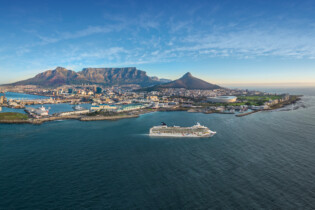According to Corporate Traveller, 88% of the global business travel sector believes addressing climate change is their top priority, while 78% of travel managers worldwide expect their corporate travellers to embark on more business trips in 2023 compared to 2022.

At face value, these statistics seem to be at odds, given that aviation accounts for around 2.5% of global CO2 emissions. However, Bonnie Smith, GM Corporate Traveller, believes that businesses don’t have to choose between green and growth.
She explains, “Offsetting your travellers’ carbon footprint, implementing a no-print travel policy, and activating alerts on various booking platforms to receive notifications regarding the most sustainable routes, are just a few ways to maximise corporate travel sustainability.”
She also suggests that an all-new trend in sustainable travel – luggage-free trips – could also be a way to minimise the carbon impact of a business trip.
‘Unpacking’ luggage-free travel
There are several benefits to travelling with only your carry-on, such as skipping the baggage claim, avoiding lost baggage delays, and being able to get around more quickly and easily as soon as you land.
However more attention is now also being given to the environmental benefits of minimal packing – including the fact that it can improve the fuel efficiency of a flight and therefore decrease its associated carbon emissions.
Smith adds, “As of 2023, eco-focused travellers are taking this travel approach to new, eco-friendlier extremes, opting to travel with nothing other than their laptop bag and the clothes on their back. Then, upon arrival, the traveller purchases clothing and essentials from local suppliers, particularly small businesses and market vendors.
“When their trip comes to an end, the final step is donating this clothing and any remaining essentials, such as toothpaste and food if they were staying in self-catering accommodation, to charities and NGOs in need. These donations help uplift local communities, and the traveller can hop aboard their return flight luggage-free once again.”

The ripple effect of benefits
The weight of an average-sized plane, such as a Boeing 737-800, is approximately 41 000 kgs. If half the passengers opt to leave their luggage at home, there’ll be an estimated weight reduction of up to 1 863 kg per flight.
Buying local at your destination – especially locally produced goods, or recycled, upcycled or second-hand items – is also a more eco-savvy choice, as it avoids the carbon emissions associated with imported products. And there’s a clear benefit to the local community.
Donating goods and clothing can also benefit disadvantaged groups and individuals. In addition, many travellers can also donate their time and/or skills by volunteering at the same charity or organisation to which they’re donating.
According to global luxury tour operator GILTEDGE, travellers are increasingly invested in having a positive impact on the communities they visit and find volunteer experiences incredibly meaningful and enriching too.
Robyn Stalson, Philanthropy Specialist, GILTEDGE Africa, says, “Over the past few years, GILTEDGE Africa has definitely seen a growing interest from our clients to make a difference in the countries they visit by being of service to the local communities or positively impacting the environment.”
Other corporate travellers are choosing to ‘Pack for a Purpose’. This global movement encourages travellers to ‘travel light’, saving space in their luggage for supplies needed by community projects in the destinations they are visiting. Since 2010, travellers who ‘Pack for a Purpose’ have brought over 188 000 kgs of needed supplies to 55 countries.
Where to begin?
Smith says, “Sustainability today needs to be on everyone’s radar. The CEO, the travel management company, and, of course, corporate travellers themselves, all need to make it a priority.”
“Sustainability today needs to be on everyone’s radar.”
She adds that, as well as the ideas suggested here, a travel management company (TMC) can assist corporates looking to travel more sustainably. For example, they will book ‘greener’ routes and direct flights, and ensure your travel policy outlines ‘green’ partners. These can include preferred rental car companies that specialise in electronic or hybrid vehicles, and sustainable accommodation providers.
A TMC can also provide incentives and work to nurture a ‘green’ company culture. After all, it’s not just about doing your bit for the environment and the communities within it – for many companies, it’s about maintaining good standing with existing and prospective clients.
“Sustainability is here to stay. People are passionate about it. Most importantly, they’re passionate about doing business with brands, partners, and suppliers who are, too,” Smith adds.
RELATED: This year’s trends for the tourism and hospitality industries







